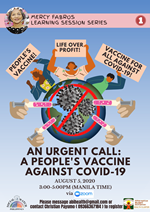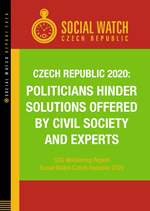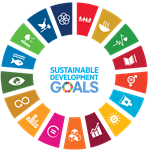Social Watch news
Published on Tue, 2020-09-01 19:00
In recent years, the opportunities and challenges presented by rapid digitalization have become a staple on various agendas across the United Nations. Within the past few months, as the socioeconomic impacts of COVID-19 increase global reliance on digital technology, the relevance of and concerns about digitalization have heightened. Digital technologies have been prominent in a number of UN processes and deliberations such as UN75, human rights reports, the Roadmap for Digital Cooperation and the 2020 High-level Political Forum. |
Published on Thu, 2020-08-27 14:21
A snapshot of the ongoing work at the United Nations in times of crisis This briefing paper looks at the financing for development (FfD) work at the United Nations in 2020, an exceptional year due to outbreak of the global coronavirus crisis in the spring. Following this shock, FfD became a highly relevant issue on the UN agenda. The FfD process as originally scheduled was redesigned, with the FfD Forum originally scheduled for April cut down from four days of face-to-face meetings to a virtual session that lasted for just one hour. An official outcome document was adopted anyway, however free of concrete commitments that would match the needs of coping with the crisis. |
Published on Thu, 2020-08-13 14:35
Statement prepared by Lebanese CSOs after Beirut’s Explosion, the statement is addressed to International Organizations, the United Nations Agencies and International Partners. On August 4, 2020, Beirut was hit by the biggest explosion in its history, leading to more than 200 killed, seven thousand wounded, and tens of missing (according to the latest figures by the Ministry of Public Health) before the Lebanese army announced that it would stop the search for the missing in addition to causing disabilities and increasing the suffering of people with disabilities in general. |
Published on Tue, 2020-08-04 15:26
Social Watch Philippines-Alternative Budget Initiative in Health (SWP-ABI Health) is launching the "Mercy Fabros Learning Session Series.” Social Watch Philippines-Alternative Budget Initiative in Health (SWP-ABI Health) invites you to the first episode tackling a timely public health discourse, “An Urgent Call: A People's Vaccine Against COVID-19" on August 5, Wednesday, (via Zoom). The pandemic is changing our lives and economies in profound ways. So massive has been the wastage of lives and the devastation caused by COVID-19 to health systems everywhere that humanity's survival has become a top priority concern. |
Published on Fri, 2020-07-24 14:38
“The world is going through a public health crisis which is turning into a global economic and social crisis. The HLPF is one of the first major intergovernmental meetings with universal participation and broad stakeholder engagement since the onset of the crisis. “It is critical that the United Nations send a strong message to all people demonstrating that we can forge consensus and give a multilateral response to the COVID-19 pandemic, and that we are committed to rebuilding better after the pandemic, with the 2030 Agenda for Sustainable Development as our roadmap. Countries, societies, youth and the media will all be looking to the United Nations for its guidance.” |
Published on Tue, 2020-07-21 00:00
Five years ago, as part of the United Nations Summit on Sustainable Development, all UN member states ratified the Sustainable Development Goals. In 2017, the government of the Czech Republic ratified the strategic document “Czech Republic 2030” whose goal was to improve the quality of life across all the regions and to put Czechia on a path to development which would be sustainable in its social, economic and environmental impacts. |
Published on Thu, 2020-07-16 00:00
On 16 July, this year's virtual UN High-level Political Forum (HLPF) on sustainable development came to an end. The HLPF is the premier UN body to monitor the annual progress on the implementation of the 2030 Agenda and the Sustainable Development Goals (SDGs) worldwide. The COVID-19 crisis has exacerbated inequalities and further endangered development gains already at risk prior to the global pandemic. |
|
Published on Mon, 2020-07-13 18:31
Since the adoption of the 2030 Agenda for Sustainable Development, member states and civil society have reported on the progress made in achieving the Sustainable Development Goals (SDGs) and the implementation of the 2030 Agenda. Monday, July 13, 2020, 8:00 am to 9:00 am (EDT). Please register here. |
Published on Thu, 2020-07-09 13:39
The COVID-19 pandemic will push 176 million more people into extreme poverty and dash hopes of eradicating extreme poverty by 2030. This is one of the main conclusions highlighted in a report presented by Mr Olivier De Schutter, the new UN Special Rapporteur on extreme poverty and human rights, to the 44th regular session of the UN Human Rights Council this week. The report was prepared by his predecessor Mr Philip Alston. |
|
Published on Mon, 2020-07-06 00:00
Web conversation in the run-up to the High-level Political Forum on Sustainable Development Monday, 6 July 2020, 8:30-10:00am EDT Please register here |











